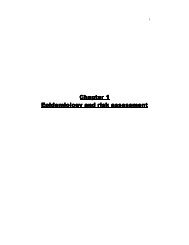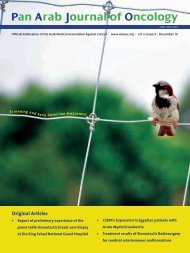Pan Arab Journal of Oncology - Arab Medical Association Against ...
Pan Arab Journal of Oncology - Arab Medical Association Against ...
Pan Arab Journal of Oncology - Arab Medical Association Against ...
You also want an ePaper? Increase the reach of your titles
YUMPU automatically turns print PDFs into web optimized ePapers that Google loves.
cancer care in the arab world | march 23-25, 2010 | riyadh, ksa <<br />
These data encouraged the health authority in many countries to implement<br />
smoking ban policy<br />
Smoking Cessation Benefits<br />
Smoking cessation is associated with important benefits such as improved lung<br />
function and a better general health and performance status. It might lead to longer<br />
survival and reduced complications <strong>of</strong> radiation therapy in lung cancer patient.(21)<br />
Costa F. et al tried to answer the question whether smoking cessation is worthwhile<br />
in patients with lung cancer as a common theme among patients that it “may be<br />
it is not worthwhile” given the bad prognosis. However, Costa found that: “it is<br />
worthwhile”.(22)<br />
(Smoking can influence lung cancer in several ways such as promoting relapse<br />
and the development <strong>of</strong> other types <strong>of</strong> cancer, smoking increases the growth and<br />
aggressiveness <strong>of</strong> tumors, nicotine interacts with the non-neuronal nicotinicacetylcholine<br />
receptors, leading to an increase in VGEF, nitric oxide and<br />
prostacyclin, inducing an increase in tumor growth, complicating surgery because<br />
smoking increases the surgical risk and postoperative complications, slowers wound<br />
healing and reduces survival after surgery, interfering with radiotherapy hence the<br />
hypoxia induced by carbon monoxide may be responsible for a worse response to<br />
radiotherapy. Smoking also increases the risk <strong>of</strong> radiation pneumonitis by promoting<br />
inflammation and diminishing the mucociliary clearance. As for chemotherapy,<br />
smoking interferes with cytochrome P450, accelerating the metabolism <strong>of</strong> several<br />
drugs including some chemotherapeutic agents (taxans, vinorelbine, etoposide,<br />
doxorubicin, gefitinib), diminishing their serum levels and their efficacy. It seems<br />
by this group <strong>of</strong> evidence that smoking cessation in lung cancer patients is in fact<br />
worthwhile.(22)<br />
Smoking cessation was associated with a decrease in the risks <strong>of</strong> ischemic stroke,<br />
subarachnoid hemorrhage, and MI.(23)<br />
Quitting smoking is associated with a substantial reduction in risk <strong>of</strong> all-cause<br />
mortality among patients with CHD, 36% reduction in crude relative risk (RR)<br />
<strong>of</strong> mortality for patients with CHD who quit compared with those who continued<br />
smoking.This risk reduction appears to be consistent regardless <strong>of</strong> age, sex, index<br />
cardiac event, country, and year <strong>of</strong> study commencement.(24)<br />
Smoking reduction was associated with a significant decrease in the risk <strong>of</strong> lung<br />
cancer. (25)<br />
Song YM, et al reported recently that smoking cessation substantially reduces the<br />
risk <strong>of</strong> smoking-related cancers <strong>of</strong> the lung, larynx, esophagus, and pancreas, and<br />
is the most effective method for reducing the risk <strong>of</strong> cancer among smokers.(25),<br />
Oral health usually improved after two weeks <strong>of</strong> tobacco cessation with resolution<br />
<strong>of</strong> smoking related oral lesion with overall improvement <strong>of</strong> periodontal and oral<br />
health.(26)<br />
Smoking Bans and Public Policies<br />
Smoking ban aims at protecting people from the harmful effects <strong>of</strong> second-hand<br />
smoke. Smoking ban policy is important tools in lowering smoking rates and<br />
promoting public health in addition lowering health service cost and improves<br />
morale and productivity and lower the overall cost <strong>of</strong> labor in a community.<br />
Effective tobacco control policies include law issuing, bans/restrictions on smoking<br />
in public areas and workplaces, increasing taxes on tobacco products, bans on<br />
advertising <strong>of</strong> tobacco products, land warning labels on cigarette boxes.<br />
The World Health Organization had published several policies and laws that helps<br />
health authority to implement cigarette smoking ban that helps many country to<br />
control the smoking habit and smoking becomes more difficult.<br />
Admissions for heart attacks dropped by 27% in Colorado after 18 months <strong>of</strong><br />
implementation. Similar results were seen in Ireland, Scotland, UK and Sweden.<br />
These results support the smoking ban fans.<br />
The European Union (EU) has been active in tobacco control policy since 1985<br />
when the Milan Council announced its intention to establish a Europe <strong>Against</strong><br />
Cancer (EAC) Programme. Shortly after the establishment <strong>of</strong> the EAC, first<br />
action plan the European Commission presented its first legislative proposals on<br />
tobacco control. Three <strong>of</strong> these proposals on labeling and maximum tar yields<br />
became Directives by 1992. The fourth on tobacco advertising finally became law<br />
in 1998 and is currently being transposed into national law in the 15 EU Member<br />
States. In 1996 the Commission published a Communication on the future <strong>of</strong> EU<br />
tobacco control and in 1999 at the 2nd European Conference on Tobacco and<br />
Health, the Social Affairs Commissioner announced his intention to bring forward<br />
further legislative proposals to amend an consolidate existing EU legislation in<br />
this sector. This article is intended to present an overview <strong>of</strong> EU tobacco control<br />
legislation from 1970 until 1998 and to look at future options post year 2000.(27)<br />
The smoking ban policies announced in Saudi <strong>Arab</strong>ia on the year 1984 with<br />
Royal order banning smoking in all governmental buildings. Unfortunately<br />
the implementation <strong>of</strong> this policy was very weak and people continue smoking<br />
breaking the royal order. More than 43 charity organizations started to be active<br />
in smoking ban campaign that result <strong>of</strong> increasing the taxation <strong>of</strong> cigarettes twice<br />
in the last tow decade and community based clinics started to receive smokers<br />
seeking help for smoking cessation maneuvers.<br />
Impact <strong>of</strong> religious rulings (Fatwa) on smoking:<br />
The Qur'ān, The holy book <strong>of</strong> Islam, does not specifically prohibit or denounce<br />
smoking directly, but gives behavioral guidance:<br />
“Don't throw yourself into danger by your own hands...” (Surat Al-Bakara 2/195)<br />
“You may eat, drink, but not waste” (Surat Al-A‘râf 7/31)<br />
Several Fatwa issued in most <strong>of</strong> Islamic countries announcing that tobacco smoking<br />
is unlawful activity “Haram” (sin) based on understanding <strong>of</strong> The Holy Quran<br />
that stated in Surat Al Araf : (The Prophet) who will enjoin upon them the doing<br />
<strong>of</strong> what is right, forbid them the doing <strong>of</strong> what is wrong, make lawful to them<br />
the good things <strong>of</strong> life, prohibit for them the evil things, and lift from them their<br />
burdens and the shackles that were (previously) upon them.(28)<br />
Smoking spoils a person's acts <strong>of</strong> worship and reduces their rewards, it spoils the<br />
prayer, which is the pillar <strong>of</strong> Islam. Allah's Messenger said: Whoever eats garlic<br />
or onion let him avoid us and our masjid, and stay in his home. The angels are<br />
surely hurt by things that hurt the human beings.(29)<br />
But although claimed that Islamic rules helped in smoking cessation program<br />
especially in Ramadan where the smoking is unlawful during the day time during<br />
fasting but few medical studies addressed this issue.<br />
24 > <strong>Pan</strong> <strong>Arab</strong> <strong>Journal</strong> <strong>of</strong> <strong>Oncology</strong> | vol 3; issue 1 | March 10 www.amaac.info









